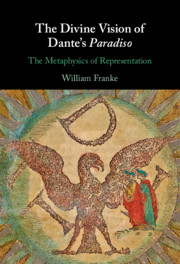
- Cited by 2
-
Cited byCrossref Citations
This Book has been cited by the following publications. This list is generated based on data provided by Crossref.
Franke, William 2022. Negative Theology and Theophany in Dante’s Paradiso. Verbum Vitae,
William, Franke 2024. The Death of God as Source of the Creativity of Humans. Philosophies, Vol. 9, Issue. 3, p. 55.
- Publisher:
- Cambridge University Press
- Online publication date:
- August 2021
- Print publication year:
- 2021
- Online ISBN:
- 9781009037839
- Subjects:
- Literature, Area Studies, European Literature, European Studies


